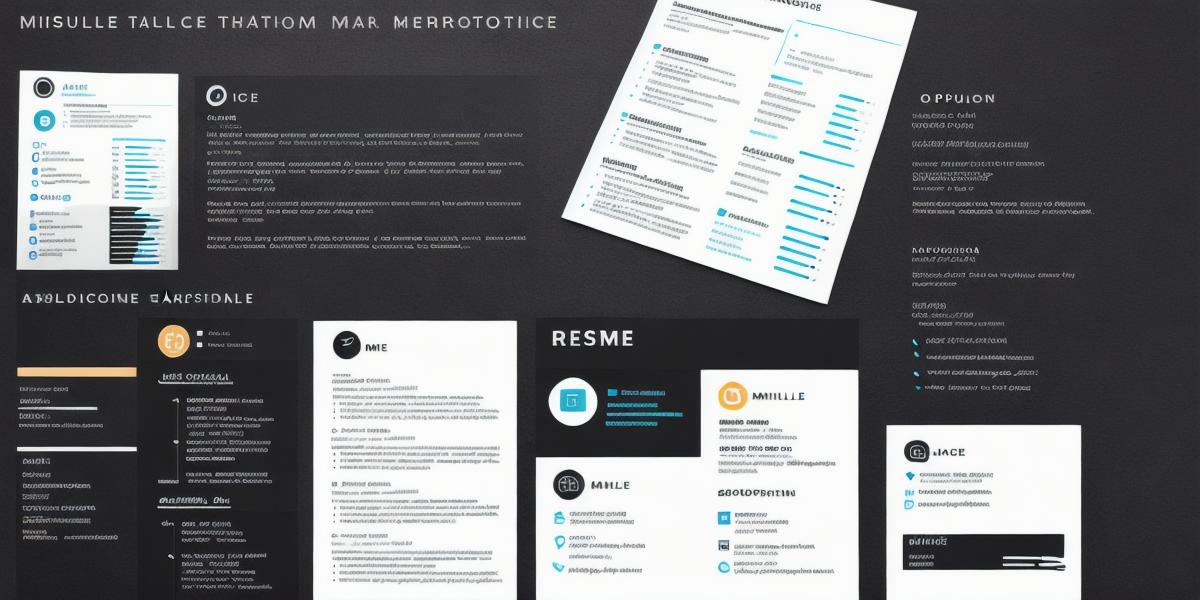The Ultimate Guide to Including Marketing Tools on Your Resume: A Comprehensive Analysis and Comparison
Introduction
In today’s highly competitive job market, having a well-crafted resume that showcases your skills and accomplishments is crucial for landing your dream job. But what are the best marketing tools to include on your resume? In this comprehensive guide, we will explore the various marketing tools that you can add to your resume to demonstrate your expertise and stand out from other candidates. We will also analyze and compare these tools based on their effectiveness and suitability for different types of job seekers.
Table of Contents:
I.
Introduction
II. Marketing Tools: What Are They?
III. The Importance of Including Marketing Tools on Your Resume
IV. Top 10 Marketing Tools to Include on Your Resume
A. Google Analytics
B. Hootsuite
C. Canva
D. HubSpot
E. Mailchimp
F. Buffer
G. Ahrefs
H. SEMrush
I. Trello
J. Asana

V. Comparison and Analysis of Marketing Tools
VI. Conclusion
VII. FAQs
I.
Introduction
Marketing tools are software applications that businesses use to promote their products or services, engage with customers, and analyze marketing data. These tools are becoming increasingly important in today’s digital age, as they enable businesses to reach a wider audience, track their performance, and optimize their strategies. In this guide, we will explore the various marketing tools that you can add to your resume to demonstrate your expertise and stand out from other candidates. We will also analyze and compare these tools based on their effectiveness and suitability for different types of job seekers.
II. Marketing Tools: What Are They?

Marketing tools come in many different forms, ranging from social media management platforms to email marketing software, SEO analysis tools, and project management applications. Here are some examples of common marketing tools that businesses use:
- Google Analytics: A web analytics service that tracks website traffic and provides insights into user behavior, such as where they came from, what pages they visited, and how long they stayed on the site.
- Hootsuite: A social media management platform that allows businesses to manage their social media accounts, schedule posts, monitor conversations, and analyze engagement metrics.
- Canva: A graphic design tool that enables users to create professional-looking graphics, flyers, brochures, and other visual content for marketing purposes.
- HubSpot: An all-in-one marketing, sales, and service platform that helps businesses attract and convert leads, manage their customer relationships, and analyze their performance data.
- Mailchimp: An email marketing software that allows businesses to create and send targeted email campaigns, track open and click-through rates, and segment their email lists based on various criteria.
- Buffer: A social media scheduling tool that enables businesses to schedule posts across multiple social media platforms, monitor engagement metrics, and analyze performance data.
- Ahrefs: An SEO analysis tool that helps businesses identify keywords, track backlinks, and analyze competitors’ strategies.
- SEMrush: Another SEO analysis tool that provides insights into keyword research, competitor analysis, and website performance.
- Trello: A project management application that enables teams to collaborate on projects, manage tasks, and track progress in a visual format.
- Asana: Another project management tool that allows teams to create and assign tasks, set deadlines, and track progress in a more structured manner.
III. The Importance of Including Marketing Tools on Your Resume
Including marketing tools on your resume is important for several reasons. Firstly, it demonstrates your expertise in marketing and shows that you have experience using these tools to achieve specific objectives. This can help set you apart from other candidates who may not have this knowledge or experience. Secondly, including marketing tools on your resume can provide potential employers with a better understanding of your skills and abilities, as well as the results you have achieved in the past. For example, if you used Google Analytics to increase website traffic by 50%, or Hootsuite to boost social media engagement by 30%, this information can be used to demonstrate your effectiveness in these areas. Finally, including marketing tools on your resume can also show that you are adaptable and willing to learn new skills, as many of these tools require a certain level of technical knowledge and proficiency.
IV. Top 10 Marketing Tools to Include on Your Resume
Now that we have discussed the importance of including marketing tools on your resume, let’s take a closer look at the top 10 marketing tools that you should consider adding to your resume.
A. Google Analytics
: As mentioned earlier, Google Analytics is an essential tool for any marketer, as it provides valuable insights into website traffic, user behavior, and performance metrics. Including this tool on your resume can demonstrate your expertise in digital marketing and analytics.
B. Hootsuite
: Hootsuite is a popular social media management platform that allows businesses to manage their social media accounts, schedule posts, monitor conversations, and analyze engagement metrics. This tool can be particularly useful for marketers who are responsible for managing multiple social media profiles.
C. Canva
: Canva is a powerful graphic design tool that enables users to create professional-looking graphics, flyers, brochures, and other visual content for marketing purposes. Including this tool on your resume can demonstrate your ability to create compelling visuals that capture the attention of potential customers.
D. HubSpot
: HubSpot is an all-in-one marketing, sales, and service platform that helps businesses attract and convert leads, manage their customer relationships, and analyze their performance data. This tool can be particularly useful for marketers who are responsible for generating new business leads and driving conversions.
E. Mailchimp
: Mailchimp is an email marketing software that allows businesses to create and send targeted email campaigns, track open and click-through rates, and segment their email lists based on various criteria. Including this tool on your resume can demonstrate your expertise in email marketing and your ability to drive engagement and conversions through email campaigns.
F. Buffer
: Buffer is a social media scheduling tool that enables businesses to schedule posts across multiple social media platforms, monitor engagement metrics, and analyze performance data. This tool can be particularly useful for marketers who are responsible for managing multiple social media profiles and driving engagement on those profiles.
G. Ahrefs
: Ahrefs is an SEO analysis tool that helps businesses identify keywords, track backlinks, and analyze competitors’ strategies. Including this tool on your resume can demonstrate your expertise in search engine optimization (SEO) and your ability to improve website rankings and drive more traffic.
H. SEMrush
: SEMrush is another SEO analysis tool that provides insights into keyword research, competitor analysis, and website performance. Including this tool on your resume can demonstrate your expertise in SEO and your ability to optimize websites for search engines.
I. Trello
: Trello is a project management application that enables teams to collaborate on projects, manage tasks, and track progress in a visual format. This tool can be particularly useful for marketers who are responsible for managing multiple projects and ensuring that they are completed on time and within budget.
J. Asana
: Asana is another project management tool that allows teams to create and assign tasks, set deadlines, and track progress in a more structured manner. This tool can be particularly useful for marketers who are responsible for managing multiple projects and ensuring that they are completed on time and within budget.
Including any of these tools on your resume can demonstrate your expertise in marketing and your ability to achieve specific objectives. However, it is important to choose the tools that are most relevant to your experience and the role you are applying for.
V. Conclusion
In conclusion, including marketing tools on your resume is an excellent way to demonstrate your expertise in marketing and show potential employers what you have achieved in the past. By highlighting your ability to use these tools effectively, you can set yourself apart from other candidates and increase your chances of landing a job in marketing or a related field. Remember to choose the tools that are most relevant to your experience and the role you are applying for, and be sure to include specific examples of how you have used these tools to achieve specific objectives.




